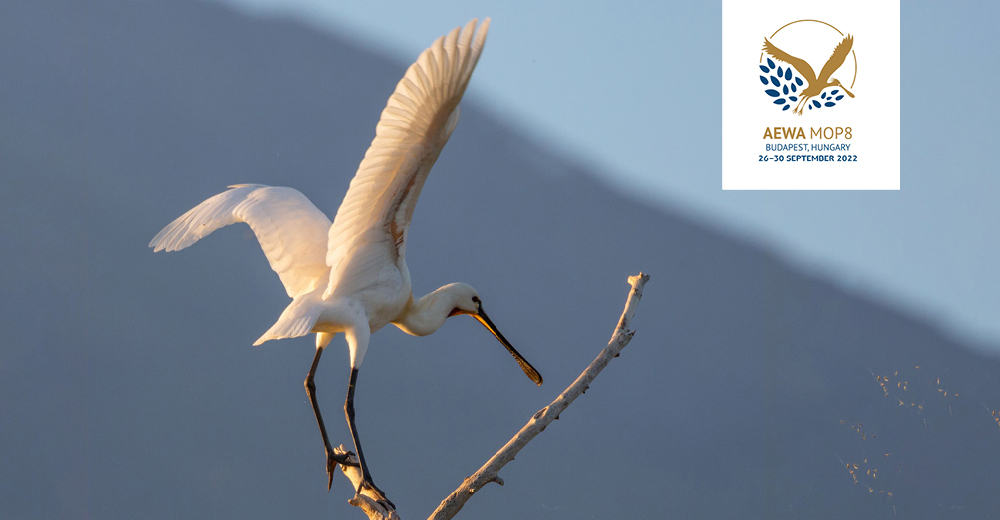Press Release: African and Eurasian Nations Commit to Strengthen Resources for the Conservation of Rapidly Declining Migratory Waterbirds

AEWA MOP8 concluded today in Budapest, Hungary © Canva.com
Countries Flock Together for Waterbirds in Budapest
Budapest, 30 September 2022 - The Eighth Meeting of the Parties (MOP8) to the Agreement on the Conservation of African-Eurasian Migratory Waterbirds (AEWA) held under the theme “Strengthening Flyway Conservation in a Changing World” concluded today in Budapest, Hungary with the adoption of 16 resolutions and new guidelines aiming to improve the conservation status of 255 migratory waterbirds listed under the UN-backed treaty. Species covered by AEWA include iconic species such as the White Stork, Red-breasted Goose and the Black Crowned Crane.
The decisions were made just days after the release of a major new report warning that half of the world’s bird species are in decline and one in eight threatened with extinction.
Through commitments made by the MOP, countries across the African-Eurasian Flyway recognize that implementing AEWA at national and regional levels helps not only to protect waterbirds, but also makes a significant contribution to tackling the triple environmental crises of biodiversity loss, climate change and pollution. Improved management of the wetlands and other habitats that waterbirds depend on is an essential part of maintaining the healthy ecosystems needed to sustain human communities in all parts of the Flyway.
“Despite the current economic crisis, we have seen countries come together here in Budapest to strengthen the Agreement’s ability to coordinate conservation measures between countries all along the flyway which stretches from the high Arctic to the southern tip of Africa and east to the Arabian peninsula and western Asia. Additional resources provided to AEWA will be dedicated to coordination of species action plans, as well as strengthening waterbird conservation more broadly across the African continent,” said Jacques Trouvilliez, the Agreement’s Executive Secretary.
AEWA MOP8 was the first major inter-governmental nature conservation meeting hosted by Hungary, with over 200 people attending including delegates from 45 Contracting Parties, 50 representatives from non-Party countries, inter- and non-governmental organizations as well as many national and international experts.
“Efforts of a single country are not enough to protect waterbirds, as they are exposed to many threats during the course of their migration. We can only protect them properly if all countries along their migration routes have the legal regulatory instruments and measures in place to ensure that they find adequate habitats and feeding areas. It is also important that these measures are coordinated. And that is unthinkable without international cooperation” said Dr Zsolt Semjén, Deputy Prime Minister of Hungary at the opening of the meeting.
Over the course of the four-day meeting, delegates considered a number of reports, including the latest conservation status report on the species listed under the Agreement published in 2021. This showed that an alarming 43 per cent of AEWA waterbird populations are in long-term decline and 33 AEWA species are globally threatened with extinction.
Among the decisions agreed by AEWA MOP in Budapest was the adoption of a new International Action Plan for the Common Eider, a declining sea-duck species covered by the treaty. The adoption brings the total to 31 action or management plans – among the most powerful tools for reversing population declines, when implemented at the flyway level.
The final days of the meeting saw other highlights, including a total of 15 side events, the presentation of the AEWA Waterbird Conservation Awards to Mr Hichem Azafzaf (Tunisia) in the individual category and BirdLife South Africa in the institutional category, as well as the recognition of the European Commission as a Champion Plus – under the Migratory Species Champions Programme – for its generous support and commitment to the AEWA African Initiative.
Notes for Editors
The Agreement on the Conservation of African-Eurasian Migratory Waterbirds (AEWA) is an inter-governmental treaty dedicated to the conservation of migratory waterbirds that migrate along the African-Eurasian Flyway. The Agreement covers 255 species of birds ecologically dependent on wetlands for at least part of their annual cycle.
With Cameroon joining AEWA as a Party on 1 October 2022, a total of 82 countries and the European Union will have signed the environmental treaty, which has a geographic range covering 119 countries across Africa, Europe, the Middle East, Central Asia, Greenland and the Canadian Archipelago.
Launched in 2014 by the Secretariat of the Convention on the Conservation of Migratory Species of Wild Animals (CMS) in collaboration with the Secretariat of AEWA, the Migratory Species Champion Programme is a fundraising scheme which has been recognized by several institutions. It is open to governments, companies, organizations and individuals willing to make a financial commitment of at least three years for one or more specific initiatives that fall under AEWA and the CMS Family umbrella. It offers a portfolio of initiatives that contribute to the implementation of a large programme targeting a species, a group of species or a cross-cutting issue.
For more information please contact:
Florian Keil, Information Officer, Joint CMS + AEWA Communications Team, Tel: +49 1511 4701633
Email: aewa-press@unep-aewa.org
For more information, please see media advisory.
Links:
Social Media:
Hashtag: #AEWAMOP8
Twitter: https://twitter.com/unep_aewa
Facebook: https://www.facebook.com/unep.aewa
Social Media Assets: https://trello.com/b/PqvYkjI9/aewa-mop8
Last updated on 30 September 2022


